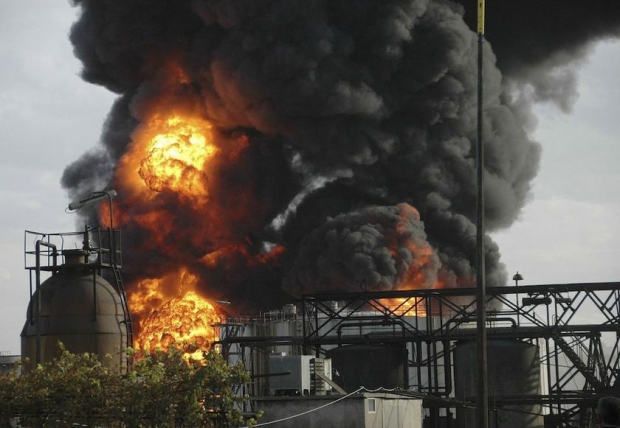U.S.-led warplanes destroy fleet of Islamic State oil tankers in Syria

Homs Oil Refinery. Representational photo.

(Reuters) U.S.-led coalition planes destroyed 168 Islamic State oil tanker trucks in Syria, the coalition said on Friday, in the largest strike of its kind and the latest instance of what U.S. officials say has been a successful effort to starve the militant group of revenues.
The air strikes targeted the truck fleet near Palmyra, Syria on Thursday, a coalition statement said. Their destruction means lost revenues of about $2 million to Islamic State, the estimated value of fuel in the trucks, the coalition said.
The strikes are part of a campaign by the U.S.-led coalition to target oil infrastructure controlled by Islamic State, which occupies swathes of territory in Syria and Iraq.
The group has been on the backfoot as an Iraqi military campaign with U.S. coalition air support has succeeded in wresting back significant territory, including a series of oil fields.
U.S. officials have shifted from simply bombing oil fields controlled by Islamic State to targeting energy infrastructure along the production chain, from processing to storage to transportation, Amos Hochstein, the State Department’s energy envoy, said in an interview on Friday.
“This is very easy oil to extract. You don’t need to be a genius to do it,” he said. “But we’re moving them from the 20th century to the 17th, 18th century.”
That has increased the cost to Islamic State of producing each barrel of oil, and has lengthened the amount of time it takes to get a barrel of oil to market, cutting into its profit margins, he said.
Alongside taxes, ransoms and trading in antiquities, oil has been a major fundraiser for Islamic State operations, with U.S. defense officials estimating that it made about $47 million per month from oil sales prior to October 2015.
The group is likely earning roughly a third of what it was from oil sales before October 2015, Hochstein said.
U.S. officials have debated whether to destroy energy infrastructure in Islamic State-controlled territory given concerns it would be harder for local populations to recover once the group leaves, Hochstein said.
But he argued that because the group itself sets fire to fields when it is pushed out, and many of the fields will need extensive repair anyway, bombing the infrastructure while it is under the group’s control will at least reduce its revenue.
“There is no oil infrastructure that survives a retreating Da’esh,” Hochstein said, using an Arabic acronym used by opponents of the group. “So I feel, bomb the hell out of it now.”
